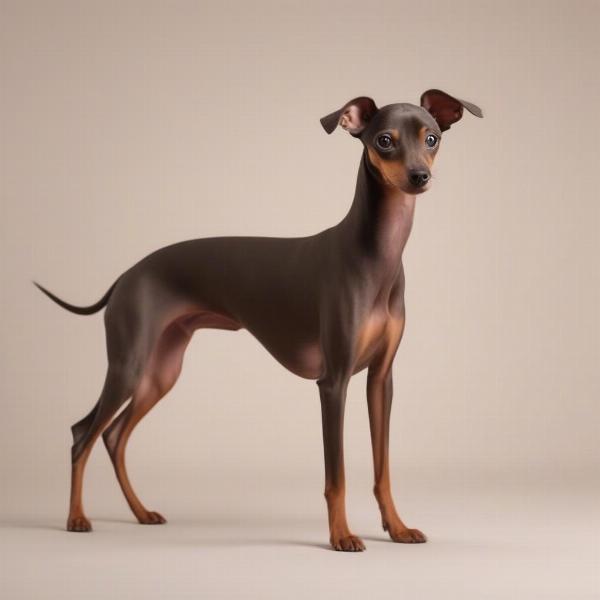Long legged dogs come in all shapes, sizes, and personalities. Whether you’re drawn to their elegant stride or simply curious about the breeds that possess this striking feature, this guide delves into the world of long legged dogs, exploring popular breeds, health considerations, and tips for providing them with the best possible care. Understanding the unique needs of these dogs is crucial for ensuring their well-being and happiness.
Popular Long Legged Dog Breeds
From the towering Great Dane to the more petite Whippet, a wide variety of breeds boast long legs. Choosing the right breed for you depends on your lifestyle, living space, and experience with dogs.
Large Long Legged Dogs
- Great Dane: These gentle giants are known for their imposing stature and loving nature.
- Irish Wolfhound: Originally bred for hunting wolves, these majestic dogs require ample space and exercise.
- Scottish Deerhound: Similar in appearance to the Irish Wolfhound, these dogs are known for their gentle and dignified personalities.
Medium Long Legged Dogs
- Whippet: These sleek and speedy dogs thrive on running and require a securely fenced area.
- Borzoi: With their aristocratic bearing and flowing coat, Borzoi are elegant and require regular grooming.
- Saluki: One of the oldest dog breeds, Salukis are independent and possess a strong prey drive.
Long Legged Small Dogs
Surprisingly, some small dog breeds also have noticeably long legs, giving them a unique appearance. These include:
- Italian Greyhound: Miniature versions of their larger Greyhound cousins, these dogs are affectionate and playful.
- Miniature Pinscher: Often nicknamed the “King of Toys,” these energetic dogs are confident and bold.
 Small Long Legged Dog Breeds: Italian Greyhound and Miniature Pinscher
Small Long Legged Dog Breeds: Italian Greyhound and Miniature Pinscher
Health Considerations for Long Legged Dogs
Long legged dogs can be prone to certain health issues, particularly concerning their bones and joints.
Joint Problems
Large and giant breeds are susceptible to hip and elbow dysplasia. Regular veterinary checkups and maintaining a healthy weight are essential.
Gastric Dilatation-Volvulus (GDV)
Deep-chested, long legged dogs are at a higher risk of GDV, a life-threatening condition. Feeding smaller, more frequent meals can help reduce the risk.
Exercise and Enrichment for Long Legged Dogs
Providing adequate exercise and mental stimulation is crucial for the well-being of long legged dogs. Their long legs often mean they were bred for running or coursing, so ensuring they have opportunities to stretch their legs is important. This could involve daily walks, runs, or even playing fetch in a secure area. long legged dogs need plenty of exercise.
Nutrition for Long Legged Dogs
A balanced diet is vital for maintaining the health of long legged dogs. Puppies of large and giant breeds require specialized diets to support their rapid growth. Consult with your veterinarian to determine the best nutritional plan for your dog. You can even find dog friendly restaurants charlottesville if you’re in the area!
Grooming Your Long Legged Companion
Grooming needs vary depending on the breed’s coat type. Regular brushing helps prevent matting and keeps the coat healthy and shiny. For smooth-coated breeds, occasional bathing is sufficient.
“Proper nutrition and regular exercise are essential for maintaining the health and longevity of long legged dogs,” advises Dr. Emily Carter, a veterinary specialist in canine orthopedics. “Paying attention to their specific needs can help prevent potential health problems and ensure a happy, active life.”
Conclusion
Long legged dogs offer a unique blend of elegance, athleticism, and companionship. By understanding their specific needs and providing proper care, you can ensure a long and fulfilling life for your long legged friend. Consider purchasing a grogu dog costume for your furry friend! Or perhaps a nice bar dog wine? Remember, choosing a long legged dog is a commitment that requires careful consideration and responsible ownership. long legged small dogs are a great option for those living in apartments.
FAQ
- Are long legged dogs more prone to injuries? Large and giant long legged breeds can be susceptible to joint issues, but with proper care and exercise, these risks can be minimized.
- What is the best food for a long legged dog? Consult with your veterinarian to determine the best diet based on your dog’s breed, age, and activity level.
- How much exercise does a long legged dog need? Most long legged dogs require a significant amount of daily exercise, including walks, runs, or playtime.
- Are long legged dogs good with children? Many long legged dogs are gentle and loving with children, but proper socialization and supervision are always essential.
- Are long legged dogs more difficult to train? Trainability varies depending on the breed, but consistent and positive reinforcement methods are effective for all dogs.
- Do long legged dogs need special grooming? Grooming needs depend on the breed’s coat type. Regular brushing is essential for most long legged dogs.
- What are some common health problems in long legged dogs? Joint issues and GDV are potential health concerns in some long legged breeds.
ILM Dog is a leading international pet website dedicated to providing expert advice on dog care and well-being. We offer comprehensive resources on dog breeds, health, training, nutrition, grooming, and more. Whether you’re a new dog owner or a seasoned expert, ILM Dog is your trusted source for reliable and practical information. From choosing the right breed to providing the best possible care, we’re here to help you navigate every aspect of dog ownership. For personalized guidance and support, contact us at [email protected] or call us at +44 20-3965-8624. ILM Dog is committed to helping you and your furry friend thrive.